5. Ethnicity Spotlight
Updated 18 November 2021
Applies to England
Introduction
This Spotlight is part of a series within the COVID-19: mental health and wellbeing surveillance report.
The report is about population mental health and wellbeing in England during the COVID-19 pandemic. It includes up-to-date information to inform policy, planning and commissioning in health and social care. It is designed to assist stakeholders at national and local level, in both government and non-government sectors.
The report is regularly updated with the most recent information available, and follows a standard structure to enable regular and easy use.
The Spotlight series describes variation and inequality in the population. Spotlights have also been published for age,gender and pre-existing mental health conditions.
This Spotlight presents intelligence on potential inequalities by ethnicity. Evidence of different mental health and wellbeing experiences are presented for people grouped by their ethnicity or on occasion by the broader BAME category including people from Black, Asian and Minority ethnic groups.
This Spotlight is composed of 2 main categories of information:
- Weekly data drawn from the University College London (UCL) COVID-19 Social Study up to week 38 of 2020 (week ending 18 September).
- Analysis from a range of ongoing academic research projects up to week 36 of 2020 (week ending 4 September).
The 2 categories of information have separate purposes.
Weekly data serves as an early warning system for large changes and differences between groups. It should not be used to draw conclusions about smaller changes or differences between groups from week to week. This is because the data has not been analysed to control for any confounding factors or potential biases.
The analysis from academic research offers a more precise picture of change over time and differences between groups. This intelligence is the basis for more nuanced interpretation and feeds into the Important findings chapter.
The latest available version of the data presented in this spotlight can be found in the Wider Impacts of COVID-19 on Health (WICH) tool.
Note:
Any deterioration of mental health captured in studies and weekly reporting should not be automatically interpreted as an increase in mental illness or need for mental health services. This is a difficult and stressful time for many, and some increases in psychological distress and anxiety are to be expected.
Note:
To enable this Spotlight to be as up to date as possible some pre-print (and therefore not yet peer reviewed) academic research is presented. Even with this approach there is still a time delay between data being gathered and findings reported.
Note:
The UCL COVID-19 Social Study focuses on the psychological and social experiences of adults living in the UK during the COVID-19 pandemic. This study is not representative of the UK population but instead was designed to have good stratification across a wide range of socio-demographic factors with data weighted to the national population.
This study sample was refreshed in late August and around 16,000 participants who had stopped submitting data routinely re-engaged. The study also changed from weekly to monthly follow up with participants allocated to one of 4 weeks.
The impact of these changes is not yet fully understood, therefore reporting of data from the point of change is indicated by a dashed line. Early interpretation of this data should be undertaken with caution. It is also important to note that some of the baseline levels for the UCL COVID-19 Social Study graphs use data from other countries and therefore may not be wholly representative of UK pre-COVID-19 levels.
The basis for the intelligence included is presented in the Methodology document.
Graphs tracking ethnicity inequalities in the population
The graphs in this section are based on weekly data, and included as an early warning system for large changes and differences between groups.
The figures below are taken from UCL COVID-19 Social Study. Most show that people from Black, Asian and minority ethnic groups tend to report worse mental health and wellbeing during the pandemic than White people. Reported decreases in rates of anxiety and depression, and increase in life satisfaction in the first few weeks since lockdown suggest some improvement in mental health and wellbeing for all ethnic groups. It is too soon to draw any conclusions about possible changes in average levels seen for some of these measures over recent weeks.
Up-to-date data is available on the WICH tool.
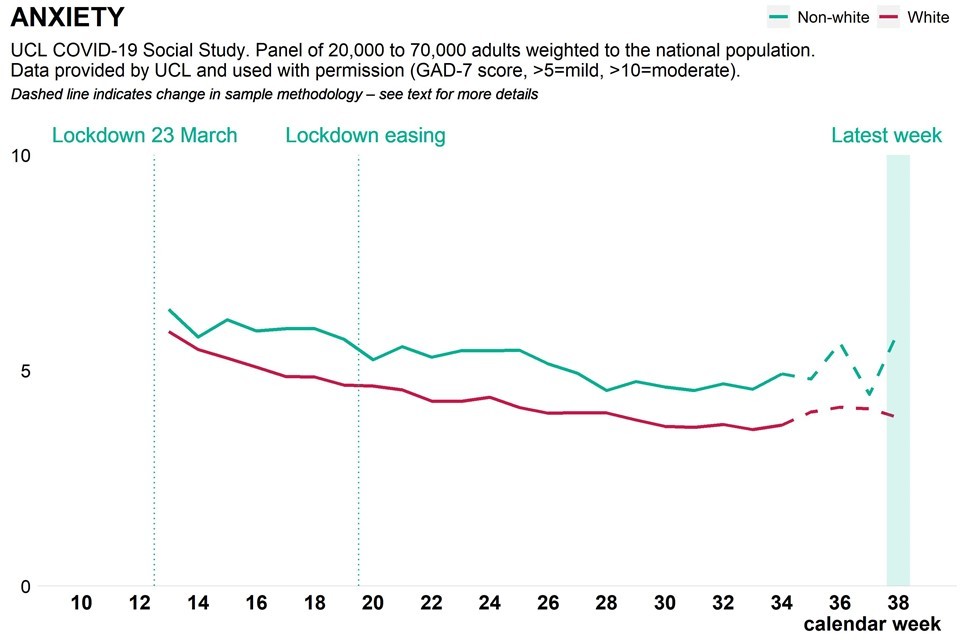
Graph showing population anxiety measure as weekly time trend over pandemic, broken down by ethnicity
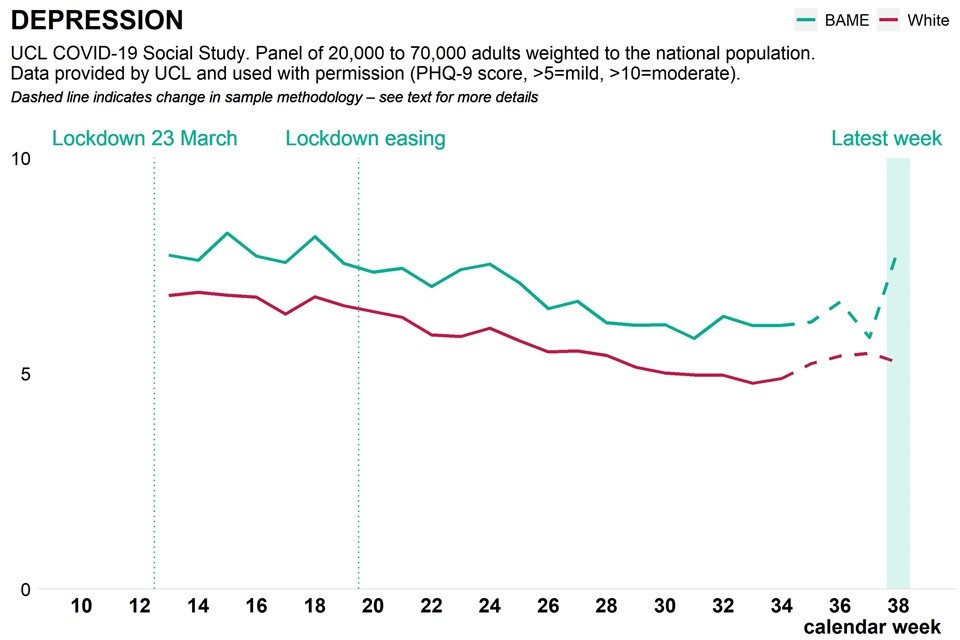
Graph showing population depression measure as weekly time trend over pandemic, broken down by ethnicity
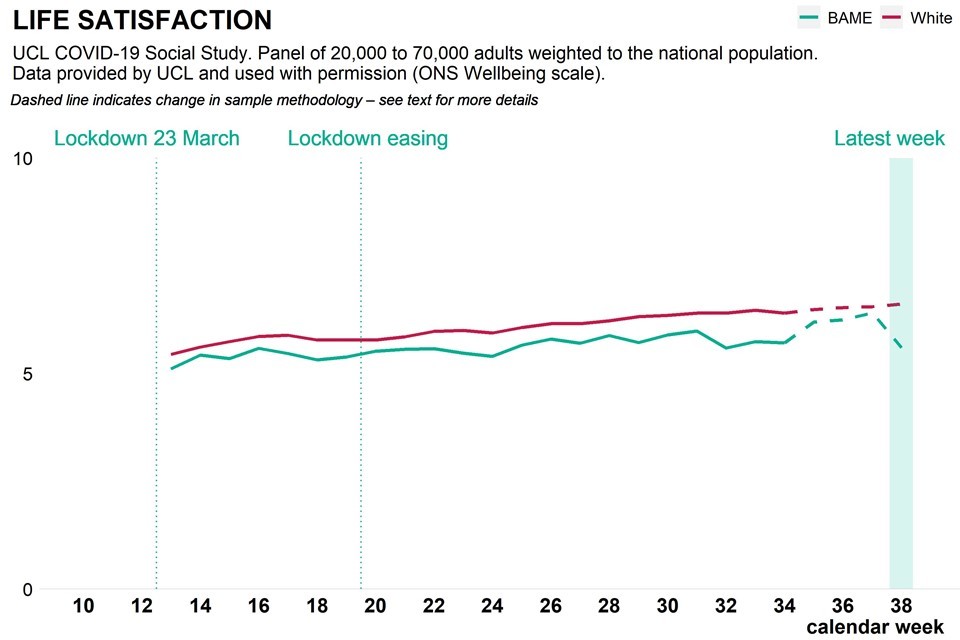
Graph showing population life satisfaction as weekly time trend over pandemic, broken down by ethnicity
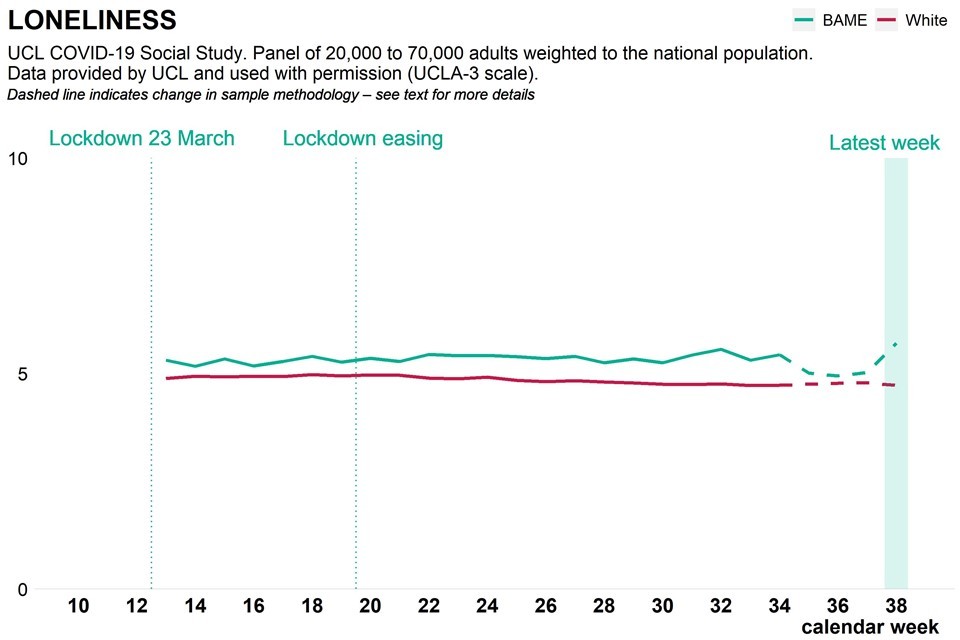
Graph showing population loneliness as weekly time trend over pandemic, broken down by ethnicity
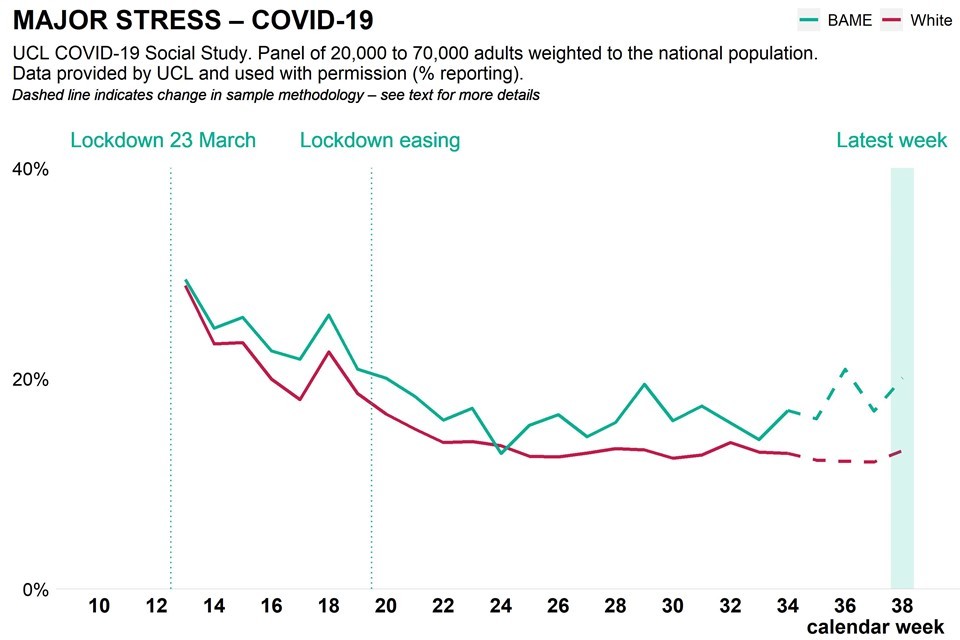
Graph showing population Covid related stress as weekly time trend over pandemic, broken down by ethnicity

Graph showing population finance related stress as weekly time trend over pandemic, broken down by ethnicity
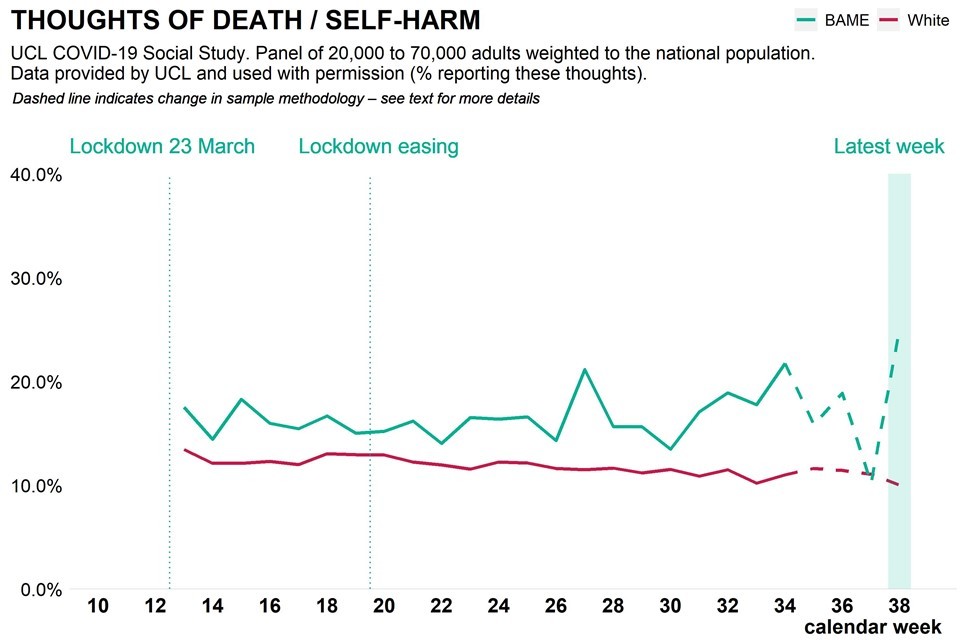
Graph showing population reported thoughts of self harm as weekly time trend over pandemic, broken down by ethnicity
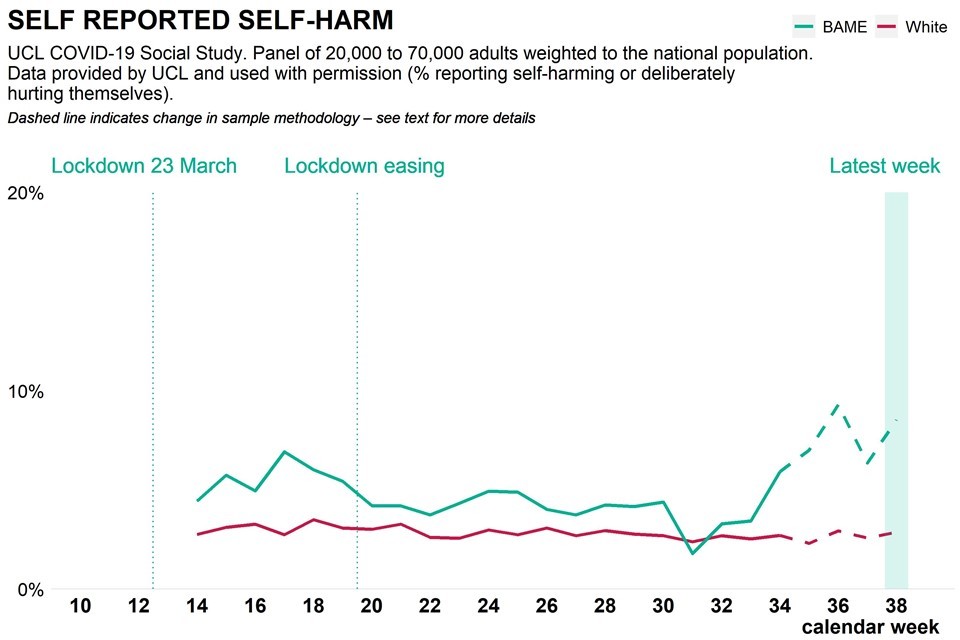
Graph showing population reported actual self harm as weekly time trend over pandemic, broken down by ethnicity
Analysis from a range of ongoing academic research projects
The analysis in this section is based on ongoing academic research, and is included to inform a more precise picture of change over time and differences between groups.
Is there evidence of variation in mental health and wellbeing during the COVID-19 pandemic by ethnicity?
The adult population, including all ethnic groups, on average have reported declines in mental health and wellbeing since the onset of the pandemic. However, so far, there is not enough evidence to confidently compare current levels or assess variation in the impact of the pandemic on mental health and wellbeing by ethnic group.
While firm conclusions cannot be made, findings from longitudinal cohort studies (presented in the sections below) point towards the following emerging factors:
-
Black, Asian and minority ethnic men (when considered together) have reported a worse decline in mental health and wellbeing than White British men since the pandemic’s onset
-
on average, Bangladeshi, Indian, Pakistani and White British men all reported statistically significant declines, with Pakistani and Bangladeshi men reporting larger declines than White British men
-
although women as a whole have reported larger declines in mental health than men, no significant differences have been identified for women by ethnic group (including when non-white ethnic groups are considered together as Black, Asian and minority ethnic women)
The question is now considered in more detail through the following studies.
Analysis of UKHLS data found:
-
in April 2020 Asian adults were more likely to report higher levels of mental distress than White British adults, but variation by other ethnic groups was not significant
-
on average, adults from all ethnic groups, including the White British group, reported declines in mental health since the onset of the pandemic
-
one study, when considering men, reports larger declines in mental health in the Black, Asian and minority ethnic group than the White British group, and suggests this may be driven by Pakistani, Indian and Bangladeshi men
-
a second study finds that Pakistani and Bangladeshi men reported larger declines than White British men, and no statistically significant decline among Black men
-
among Pakistanis and Bangladeshis, adults living in areas with more residents of the same ethnicity reported smaller declines in mental health
-
among women, there was no evidence of a difference in mental health decline across ethnic groups, including when grouping Black, Asian and minority ethnicities together
-
among Black, Asian and minority ethnicity adults, there was no evidence of a difference in mental health decline by gender
-
Black, Asian and minority ethnicity adults were more likely to report sleep deprivation due to the pandemic than White British adults
-
on average, adults from all ethnic groups reported a decrease in perceived contact within the neighbourhood
-
Pakistani, Bangladeshi and Black Caribbean adults reported the largest reductions in perceived neighbourhood communication
Analysis of COVID-19 Social Study data found:
-
no evidence that increases or decreases in levels of depression during the pandemic were associated with ethnicity
-
that the self-reported frequencies of abuse, self-harm and thoughts of suicide or self-harm were higher among Black, Asian and minority ethnicity respondents (when grouped together)
Analysis of COVID-19 Health and Stress study data found:
-
that although there were very few differences in the impact of the pandemic on respondents by ethnicity in terms of anxiety and depression, Black, Asian and minority ethnicity respondents reported greater levels of stress (when grouped together)
-
once differences in age, gender and positive or negative life experiences were accounted for Black, Asian and minority ethnicity respondents reported greater levels of loneliness and worry about contracting COVID-19
Comparison with pre-COVID-19 trends
It is important to view recent evidence in the context of evidence about differences in mental health and wellbeing by ethnicity before the pandemic.
The Adult Psychiatric Morbidity Survey (last collected in 2014) was used to estimate the prevalence of common mental disorders (CMD). Among men, the data showed no evidence of variation by ethnic group. However, there was evidence of variation among women.
After accounting for the age of respondents, non-British White women were less likely than White British women to have a CMD, and Black and Black British women were more likely to have a CMD than White British women. However, these comparisons are also based on relatively small ethnic minority sample sizes – for example 67 from the Black/Black British men group and 272 from the White Other women group.
In summary
Early evidence about the impact of the COVID-19 pandemic on mental health and wellbeing by ethnicity suggests that on average, Bangladeshi, Indian, Pakistani and White British men have all reported statistically significant declines in mental health. Also, Pakistani and Bangladeshi men have reported larger declines than White British men. Among women, there was no evidence of a difference in mental health decline across ethnic groups.
Further, among Black, Asian and minority ethnic adults, there was no evidence of a difference in mental health decline by gender. This suggests that the gender gap, with a larger deterioration in mental health among women than men reported across a number of studies, is a phenomenon mostly seen within the White British population.
It is important to note that the sample sizes for minority ethnicity respondents in these studies are relatively small. This makes the estimates less precise. In addition, the interaction between ethnicity and potential confounding factors needs further consideration. Potential factors include income, employment as a key worker and family/caring responsibilities. Observations so far can only suggest associations.
It is unlikely that ethnicity in itself is the cause of differences in the mental health and wellbeing impact of the pandemic. Instead ethnicity may be correlated with other factors that may cause a difference. It remains difficult to draw conclusions about ethnicity, interactions with gender and mental health during the pandemic.
